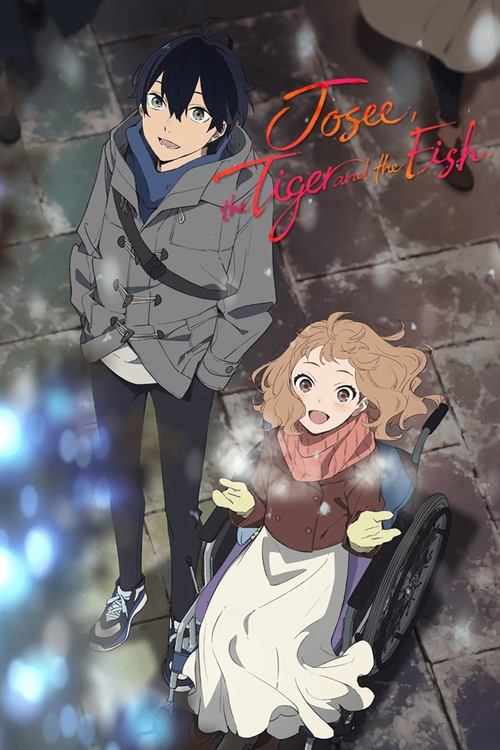
Title: Josee, the Tiger and the Fish
Year: 2020
Director: Kotaro Tamura
Writer: Sayaka Kuwamura
Cast: Taishi Nakagawa (Tsuneo Suzukawa (voice)),
Kaya Kiyohara (Kumiko 'Josee' Yamamura (voice)),
Yume Miyamoto (Mai Ninomiya (voice)),
Kazuyuki Okitsu (Hayato Matsuura (voice)),
Lynn (Kana Kishimoto (voice)),
Runtime: 98 min.
Synopsis: With dreams of diving abroad, Tsuneo gets a job assisting Josee, an artist whose imagination takes her far beyond her wheelchair. But when the tide turns against them, they push each other to places they never thought possible, and inspire a love fit for a storybook.
Rating: 8.299/10
Ripples of Resilience: The Delicate Power of *Josee, the Tiger and the Fish*
/10
Posted on July 19, 2025
In Josee, the Tiger and the Fish (2020), director Kotaro Tamura crafts a visually poetic and emotionally nuanced adaptation of Seiko Tanabe’s short story, reimagining a tale of disability, love, and self-discovery with a delicate yet unflinching gaze. This Japanese anime, produced by Bones, stands out for its ability to balance tender intimacy with raw human complexity, largely through its masterful interplay of screenplay, voice acting, and cinematography. The film follows Tsuneo, a college student and aspiring marine biologist, who forms an unlikely bond with Josee, a young woman with cerebral palsy who uses a wheelchair. Their relationship, neither saccharine nor tragic, becomes a lens to explore agency, vulnerability, and the courage to dream beyond societal constraints.
The screenplay, penned by Sayaka Kuwamura, is the film’s beating heart. It sidesteps melodrama, letting Josee’s sharp wit and guarded defiance shine alongside Tsuneo’s earnest, sometimes fumbling compassion. Their dialogue feels lived-in, capturing the awkward hesitations and quiet epiphanies of two people navigating their differences. The script’s restraint is its strength, allowing subtext to carry the weight of Josee’s internal struggle her yearning for independence clashing with her fear of rejection without resorting to heavy-handed exposition. However, the pacing occasionally stumbles in the second act, where secondary characters, like Josee’s overprotective grandmother, feel underdeveloped, leaving some emotional threads unresolved.
Cinematography, under Kenji Fujisaki’s direction, elevates the narrative with breathtaking fluidity. The film’s use of water imagery rippling aquariums, rain-soaked streets, and ocean vistas mirrors Josee’s emotional ebbs and flows, rendering her inner world as vivid as the physical one. A standout sequence, where Josee imagines herself swimming freely, blends vibrant blues and greens with surreal, dreamlike animation, offering a visual metaphor for her unbridled spirit. Yet, the film’s reliance on these motifs can feel repetitive, occasionally overshadowing quieter character moments.
The voice acting, particularly Suzuko Mimori’s portrayal of Josee, is revelatory. Mimori imbues Josee with a fierce, multifaceted vitality her tone shifts from biting sarcasm to fragile hope, making Josee feel achingly real. Taishi Nakagawa’s Tsuneo complements her with a grounded warmth, though his performance lacks the same depth in moments of conflict. Evan Call’s score, while evocative, sometimes leans too heavily on sentimental strings, risking emotional manipulation where subtlety would suffice.
Ultimately, Josee, the Tiger and the Fish is a triumph of empathy and artistry, celebrating resilience without romanticizing disability. Its flaws uneven pacing and occasional over-reliance on visual motifs are minor against its profound ability to portray love as a catalyst for mutual growth. Tamura’s direction ensures that Josee’s story is neither a lesson nor a tragedy, but a vibrant testament to living boldly within one’s truth.
0
0
